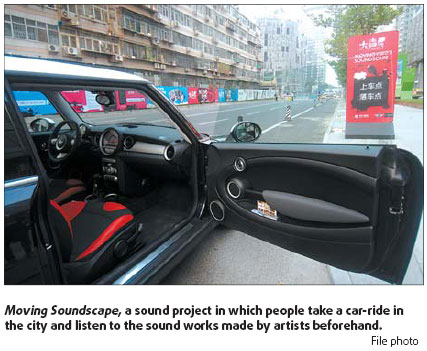Stating the reading obvious

Imagine it: taking a leisurely ride in a creamy BMW Mini Cooper. The seat feels comfortable and the light car perfume makes you sleepy. The sun-bathed buildings against a blue sky run backward as the car weaves through the bustling commercial district and the oldest streets.
But it may not be as sweet as it sounds, when the car stereo plays a man's voice instead of music. He is simply reading words you can see outside - the company's name on a taxi, the streets' names on the guideposts, the time on the mailbox, the slogan on ads, and the names and phone numbers of restaurants and stores.
Bety, the passenger, looks amazed at first. She listens attentively and looks out of the window for characters being referred to. She laughs at the hilarious addresses and shop names. She takes photos with her digital camera. For a while, she just gazes into the street scenes.
"It feels like being on a bus on my way to the office. Billboards flash before my eyes. I read what they say to myself. But it is different this time. Every one in the car keeps silent so that the only loud sound we hear is the reading," says Bety, a website worker who declined to give her real name.
"Sometimes the voice sounds boring. It makes the skyscrapers look really depressing. Many restaurants hang four or five or even more signboards. He repeats and repeats and even shouts in the end. Not until that moment have I ever felt the streets to be more annoying and suffocating," she says.
Bety doesn't realize that she has participated in a sound project, Beijing's Concrete Poems, by two Taipei-based sound artists.
"Passengers are part of the project. They see those words and hear the characters being read out. The sounds enter their minds and form new patterns, which awake people to the pace and sickness of the city," says Xu Ya Zhu, who co-creates the project with Lin Qi Wei, the reader.
It is part of Moving Soundscape, a special sound project that combines sound art and urban geographic research. Artists plot a 40-minute car-ride. They sample city noises en route and recreate new sound works beforehand. Aside from Beijing's Concrete Poems, there are two other options, RYC Plan by Beijing artist Zhang Anding and Sound Atlas by Sun Lei.
On every Saturday and Sunday afternoon during Get It Louder, people can embark on the unique audio-and-visual itinerary in which they can rediscover the city.
The sound art has been in China for only a few years. The earliest pioneers came from the underground rock scene. Later, the new generation of creators jumped onboard through the Internet. Together, they craft an art that neither fits squarely in the music nor the contemporary art scene.
The project explores one question: where the sound will be if it becomes independent of the stage, the set time and space, and the stereo and records?
Homeshow is another project, in which the sound artists seek to answer this question. It means holding interactive art shows in people's homes. It requires few resources and is relatively cheap compared to a professional exhibition.
While some may argue that Moving Soundscape is a pure sound game, Homeshow seems to be more substantial. It bears the idea of this year's Get It Louder that "everyone is a curator". It helps break the limits of small circles and extend the channels of communication.
When Xiao Bai posted the notice of a homeshow at her home on Sunday night on Get It Louder's website, she didn't expect to get many registrations. She got 40.
Xiao works at an ad company and is a part-time drummer and amateur photographer. She often holds parties at home. Still, she feels nervous about receiving so many guests, mostly strangers, at one time.
Sound Intestine is an interactive experiment created by artist Lin Qi Wei. Participants sit on a black, small, round mat in circles. In the center, Lin pulls out a white scroll and passes the strip to a girl sitting beside him. People pronounce characters on the ribbon as it is passed down along. Some read out loud, and some just murmur to themselves. It takes about 15 minutes until the last person finishes the last character, and all clap to thank the artist.
Lin then plays a video that shows people in other places doing the same experiment. He explained that Sound Intestine, like Beijing's Concrete Poems, cares about the past, present and future. "Whatever you see or hear in the past, present or in the future has already been set."
(China Daily 08/24/2007 page18)














